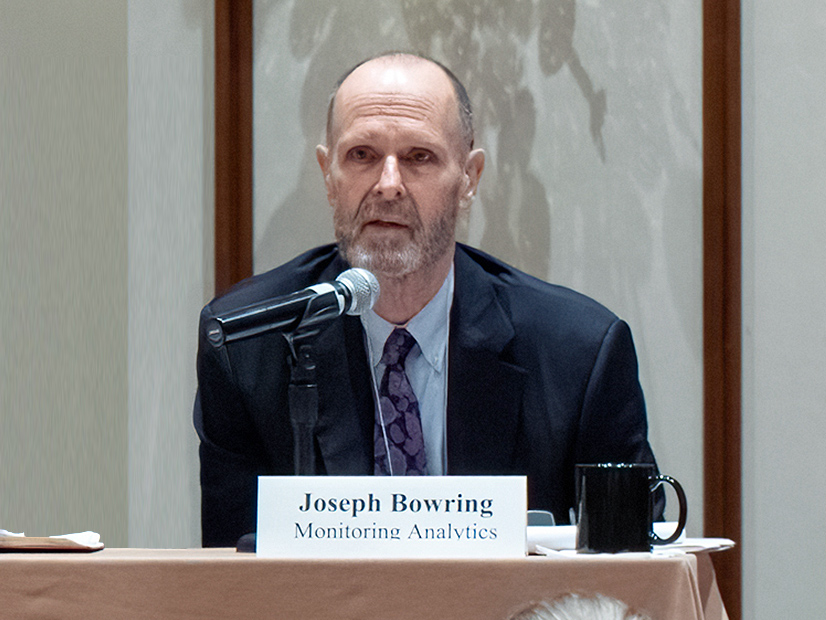
VALLEY FORGE, Pa. — The Market Implementation Committee rejected a PJM issue charge that envisioned adding notice that Base Residual Auction (BRA) rules are subject to change, with two-thirds of stakeholders opposed.
PJM Associate General Counsel Chen Lu said the issue charge was borne of a 3rd U.S. Circuit Court of Appeals March opinion. Allowing PJM to revise the reliability requirement for the DPL South locational deliverability area (LDA) after the parameter had been posted would violate the filed rate doctrine, the court ruled. (See 3rd Circuit Rejects PJM’s Post-auction Change as Retroactive Ratemaking.)
The issue charge deliverables include notice that PJM may “correct capacity auction rules, provided FERC has approved such rules,” and that such rules are known in advance of the auction “to allow those submitting offers to do so in reliance on conclusive rules and the orderly administration of the capacity market. Market sellers would be permitted to revise any pre-auction elections that occurred prior to FERC approval of any auction rule changes.”
The scope includes adding language that there are no legal consequences associated with the posting of the planning parameters, which Lu said was intended to address the court opinion that once a posting is made, it is binding unless there was prior notice of the potential for changes. The issue charge states that member recommendation would be required for changes to the installed reserve margin (IRM) or forecast pool requirement (FPR).
Prior to the vote, Lu said the issue charge would seek proposals allowing PJM to ask FERC to change any relevant deadlines for pre-auction activities or the commencement of the auction. If the commission granted changes to auction rules or parameters that already had been set, the issue charge called for proposals to allow market participants to revise their elections.
Several stakeholders argued that granting PJM the change would undermine market certainty by allowing PJM to set dates certain for auction parameters and the rules defining them, only to change them after the fact. There also were questions of how much review stakeholders would have before PJM files possible changes with FERC.
Independent Market Monitor Joe Bowring said allowing such changes to the conduct of capacity auctions would be a drastic change that would undermine market certainty and might limit the time available for the PJM and Monitor to review offers into the auction. He argued the issue charge would be an “overreaction” to the court decision.
“PJM explicitly created a period of 60 days at the end of the offer submission process to permit anyone to take issues with market offers to FERC prior to an auction. PJM’s proposed approach could eliminate that period that was designed to reduce the probability of any party challenging auction results,” he said.
Calpine’s David “Scarp” Scarpignato said PJM already makes changes to auction postings and parameters and questioned what additional changes would be in scope.
Lu responded that PJM’s reading of the court opinion is that changes can be made only within the existing rules governing the auction, while the proposal would allow petitioning FERC to change those rules.
Scarp also said the language allowing relevant deadlines and auction elections to be changed was vague, stating that modifying a parameter could change the viability of bilateral transactions or make it worthwhile for a generation owner to seek an exemption from the requirement that resources offer into the capacity market.
Vistra’s Erik Heinle said the revisions made to the issue charge would improve market certainty and parameters occasionally may need revising when new data comes in or if it’s determined that posted data is incorrect. He added that it’s important that stakeholders are involved in the process.
Lu pointed to FERC Chair Willie Phillips’ concurrence in the commission’s order reversing its authorization of the reliability requirement change, in which Phillips called for changes to allow for corrections of errors in auction design. (See Following Court Ruling, FERC Reluctantly Reverses PJM Post-BRA Change.)
“This proceeding should lead all stakeholders, including both PJM and the generators that will reap the more than $100 million windfall due to the court’s decision, to take all necessary steps to ensure that we never find ourselves in this position again,” Phillips wrote. “That includes putting in place controls to ensure that a similar error does not reoccur and, should it somehow happen again, that PJM or the commission has the authority to correct that error and protect customers from such a manifestly inequitable result. Basic equity, and the public interest, demand nothing less.”



